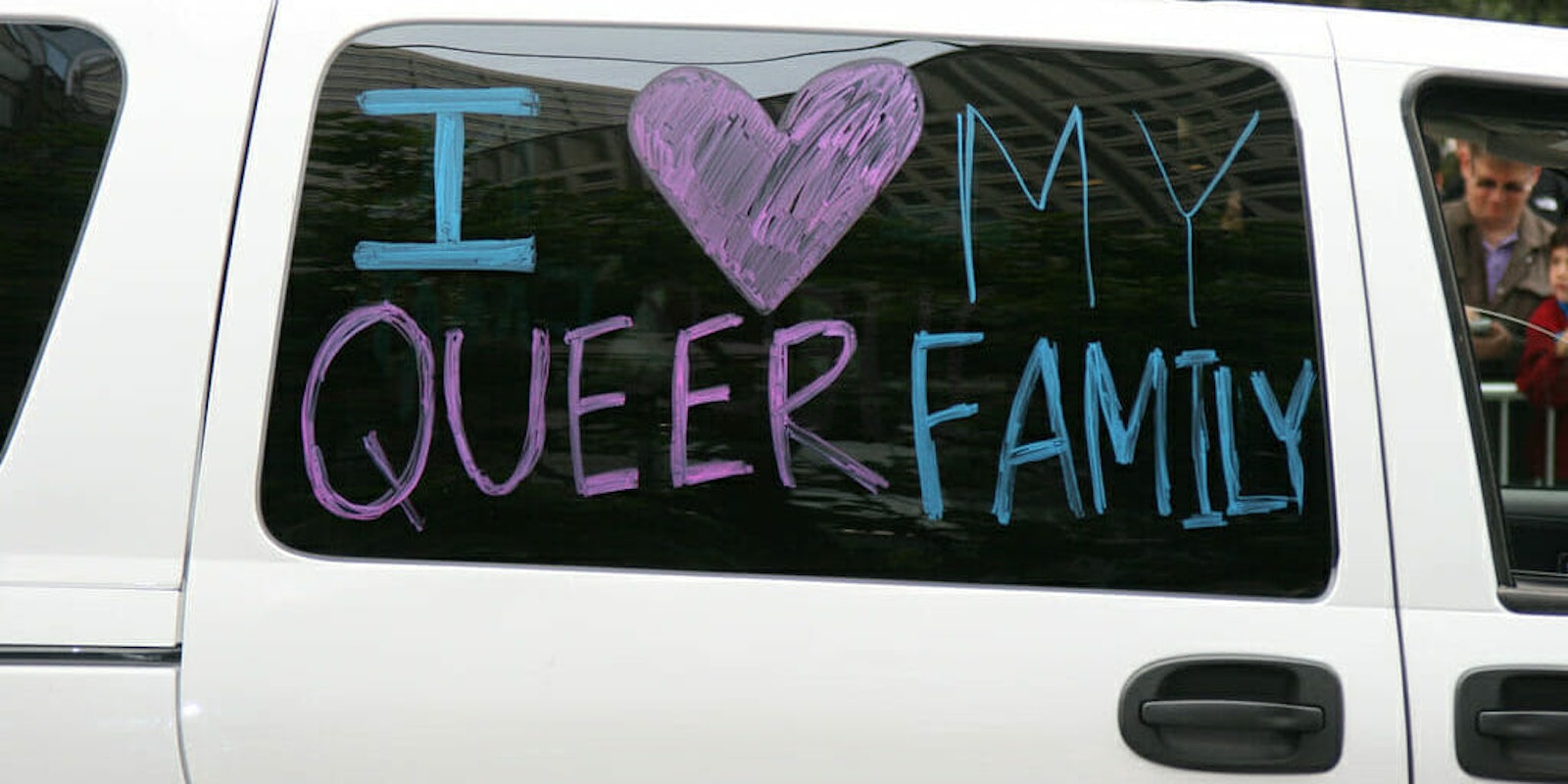If you heard about the anti-LGBTQ adoption bills which inched ever closer to being signed into law over the past week, it wasn’t because of cable TV.
Not a single cable news outlet covered “religious freedom” legislation in Kansas and Oklahoma lawmakers targeting same-sex couples looking to adopt a child, according to the progressive nonprofit Media Matters. After a pair of bills were approved by state lawmakers on Thursday and Friday, cable news stations like CNN, Fox News, and MSNBC ignored their probable passage.
These channels were joined by broadcast stations like ABC News, CBS News, and NBC News—which declined to give these bills even a moment of airtime.
The advocacy organization claimed that print media fared slightly better when reporting on the discriminatory legislation, which would make it legal for adoption and foster care centers to deny placement to LGBTQ couples on the basis of their sincerely held religious beliefs.
The Associated Press, the nation’s largest newswire service, devoted seven stories to the anti-LGBTQ adoption bills—the highest among outlets surveyed.
Aside from the AP, it’s a mixed bag. While the Los Angeles Times and the New York Times ran five and four articles, respectively, on the legislation, every single one of those write-ups was pulled from the AP wire. Only the Washington Post, which ran five AP stories about the bills, and Reuters contributed original reporting on the subject.
But even the Post reportage left something to be desired. In a larger piece about the state of anti-LGBTQ bills advancing in state legislatures, the Kansas and Oklahoma bills take up just 21 words of space—combined.
Meanwhile, two outlets didn’t cover the news at all: USA Today and the Wall Street Journal.
If the legislation is signed into law, Kansas and Oklahoma would become the eighth and ninth states allowing faith-based adoption centers to turn away applicants based on their gender identity or sexual orientation. Critics of “religious freedom” adoption bills say they could also allow entities to discriminate against interfaith couples, divorcées, single parents, or people of non-Christian faiths.
When considering the potential impact of these proposals on LGBTQ families, advocacy groups claimed the lack of national coverage is frustrating.
“The child welfare bills recently passed through the legislatures in Kansas and Oklahoma could harm kids waiting for homes while using taxpayer funds to discriminate against LGBTQ people,” said Nick Morrow, a press secretary for the Human Rights Campaign, in a statement.
“At this time, it is imperative a bright light be shone on this legislation,” he continued. “LGBTQ advocates, faith leaders, businesses, child welfare organizations, and more will continue to do this during this critical interim period.”
“We are disappointed the passage of these anti-LGBTQ bills is not attracting more attention in national media, especially given the outrage we know people across the country feel when vulnerable children are targeted,” added Ed Harris, chief communications officer for the Family Equality Council, in a statement to INTO.
Harris noted that “80 faith organizations and faith leaders signed on to a letter opposing” the Kansas legislation, known as Senate Bill 284. Fifty-one of those organizations operate within state lines.
“The opposition to these bills from the faith community is clear,” he added.
If the anti-LGBTQ adoption laws in Kansas and Oklahoma have met such widespread criticism, why hasn’t that translated to greater coverage in mainstream media outlets? Advocates cite two reasons: 1) Donald Trump’s outsize presence in the news cycle and 2) the belief that these stories are local, not national.
“National TV news outlets undercover the rollback of LGBTQ rights in part because they are consumed with Trump-related scandals,” said Brennan Suen, Media Matters for America LGBTQ Program Director, in a statement to INTO.
“When national media ignore discriminatory bills being passed at the state level, they fail to educate their viewers about policies that may directly impact them,” he continued. “It’s important for media to cover policies, not just politics. National media may ignore bills like these because they seem like local stories, but when you take a step back and look at the whole picture, the scale of this attack is alarming.”
National news outlets, however, still have time to address the dearth of attention paid to statewide adoption legislation. The Oklahoma and Kansas bills are still awaiting a verdict from their respective governors before they are signed into law.
Oklahoma Republican Mary Fallin has not stated whether she plans to approve Senate Bill 1140. Although the version of the legislation which passed the House of Representatives on April 29 excluded adoption centers which receive state or federal dollars, that amendment was removed during conference committee. Thus, even government-funded entities will be permitted to discriminate.
But Kansas’ Jeff Colyer, also a conservative, has already vowed to sign SB 284. He claimed the legislation would “[increase] the opportunities for needy children to find loving homes” by preventing religious providers from leaving the state.
“Catholic Charities and other adoption agencies are key to the fabric of our communities,” Colyer said in a press release.
As the fate of these bills hang in the balance, advocates say mainstream news outlets play a crucial role in leading a national conversation on LGBTQ rights. By covering discriminatory legislation, journalists have the ability to educate the public about challenges to queer and trans equality under the current administration.
“These adoption bills aren’t passing in a vacuum,” Suen said. “They are just one piece of anti-LGBTQ opponents’ strategy to legalize discrimination against LGBTQ people across the country.”
“Anti-LGBTQ groups and their allies found success in Oklahoma and Kansas this year, and they may find success in your state in the future,” he continued. “People should be prepared to see these kinds of bills popping up in states across the country and at the national level, and the media has a responsibility to inform them of that.”


